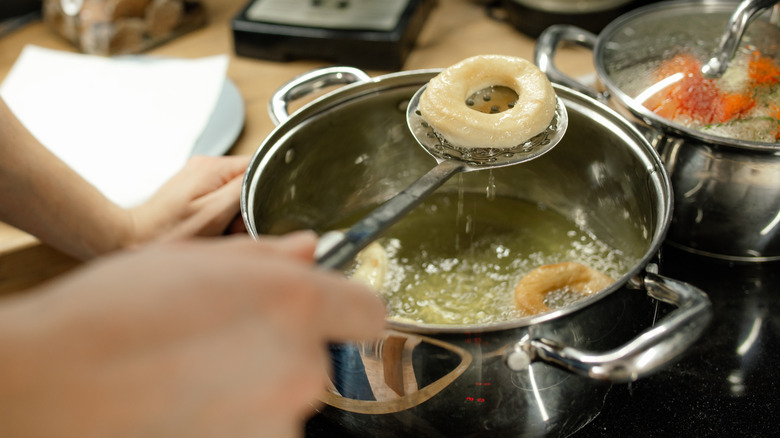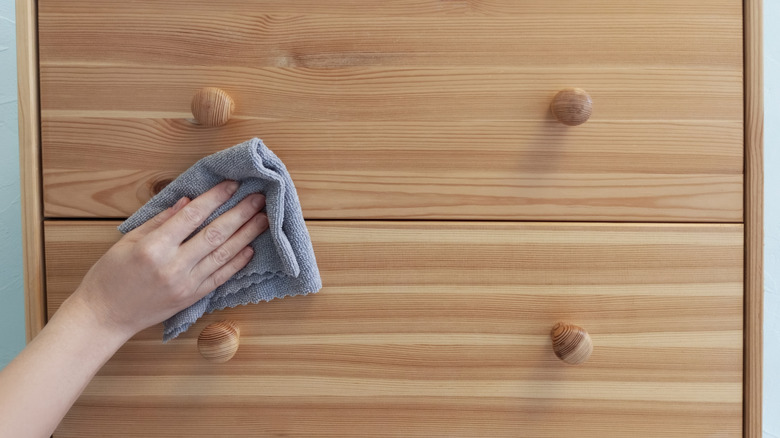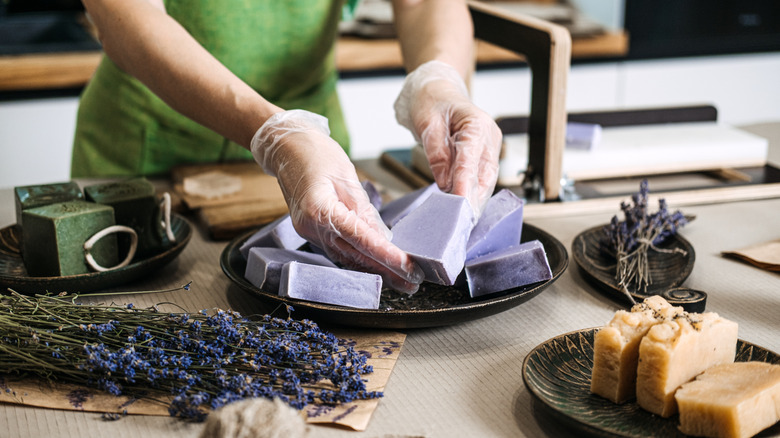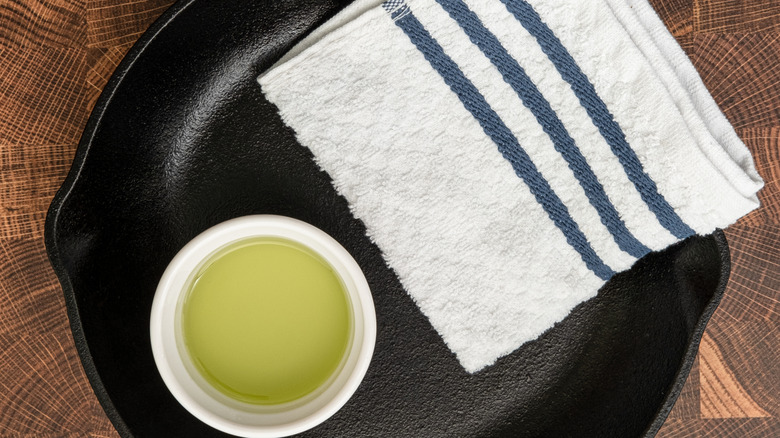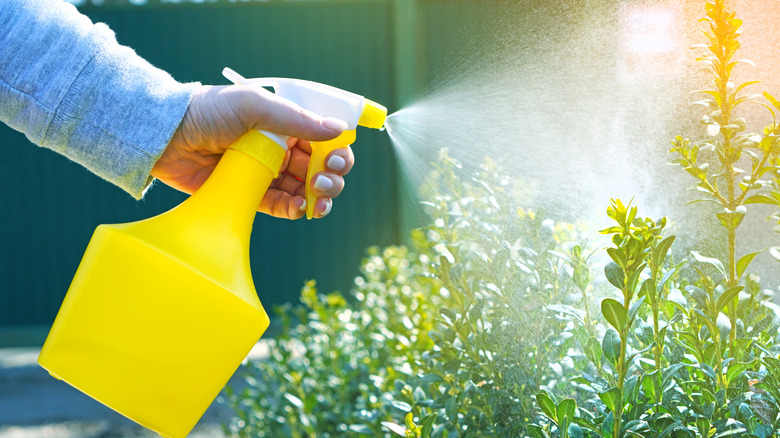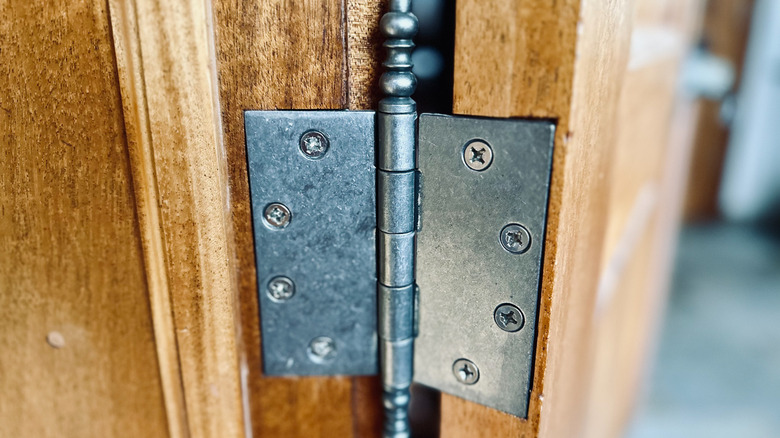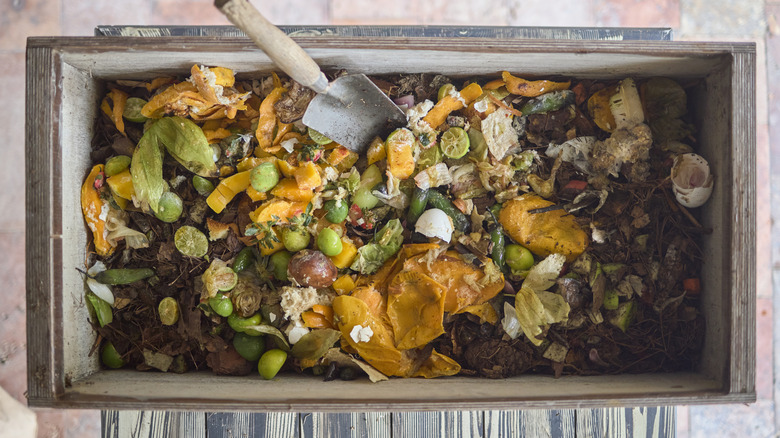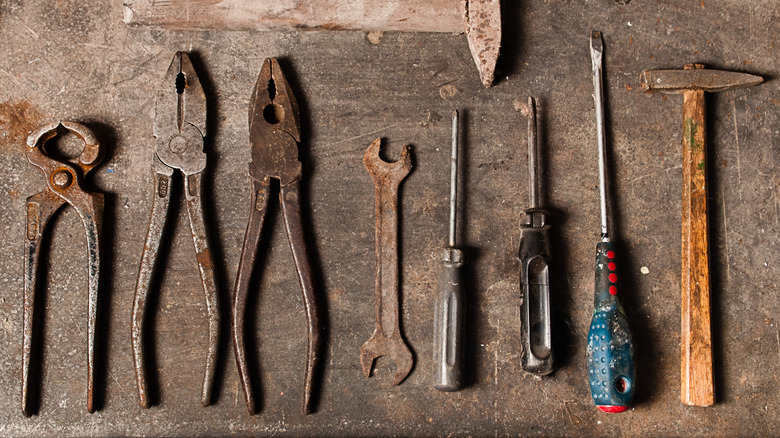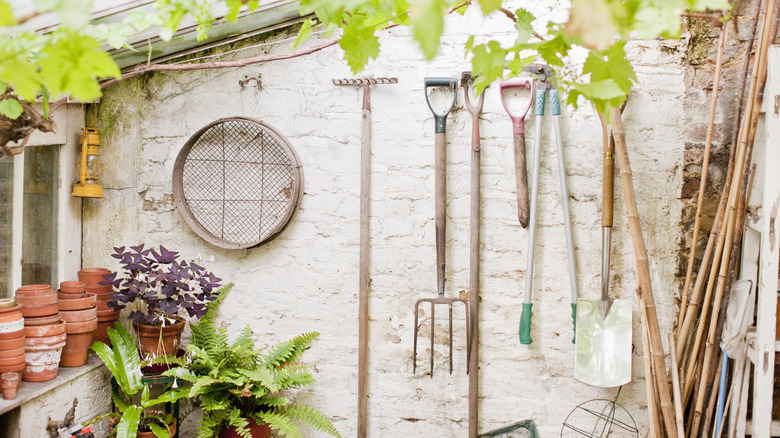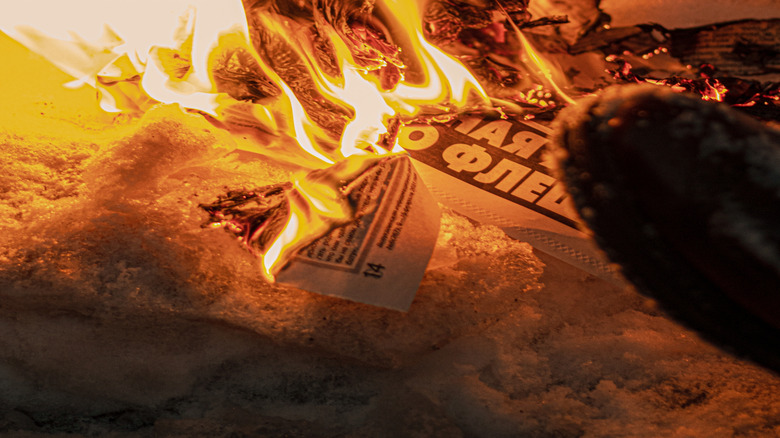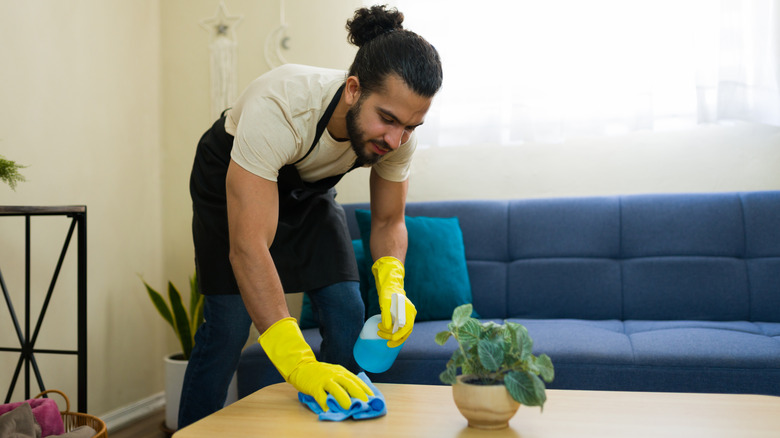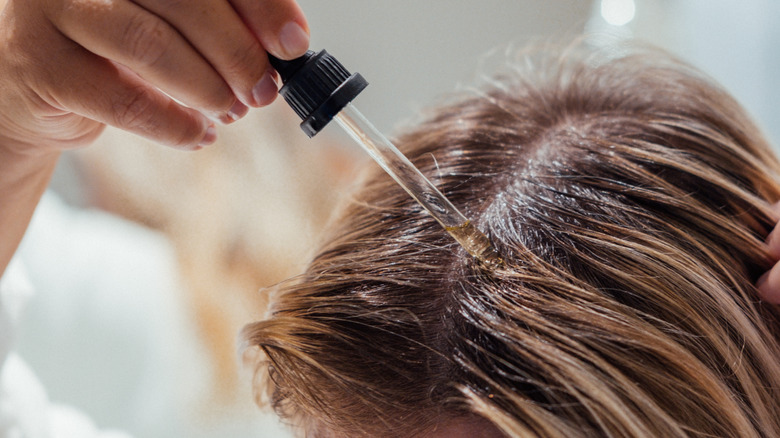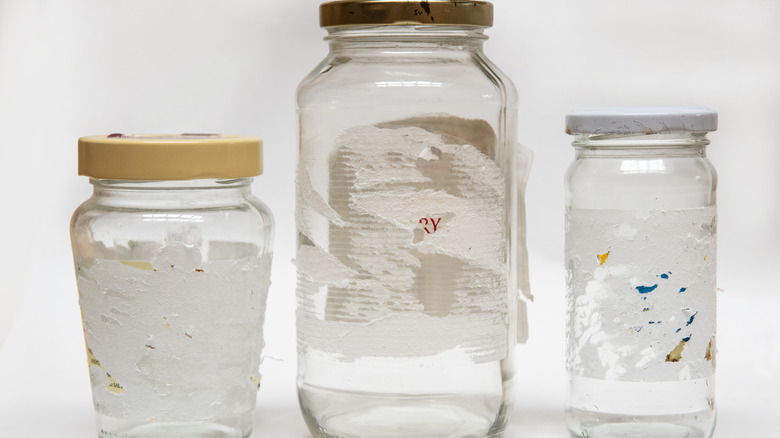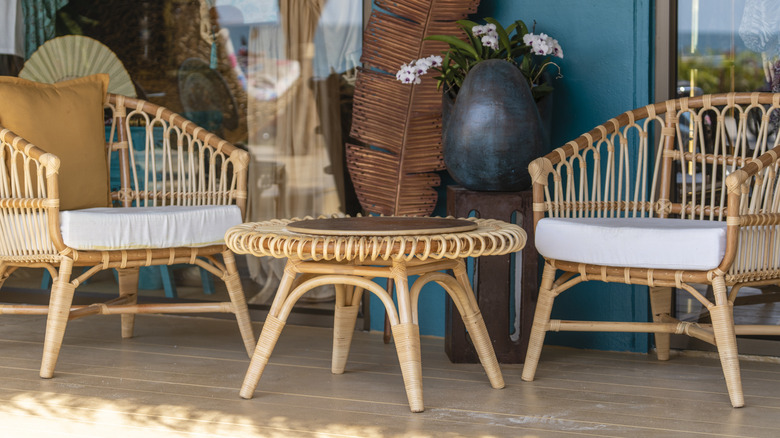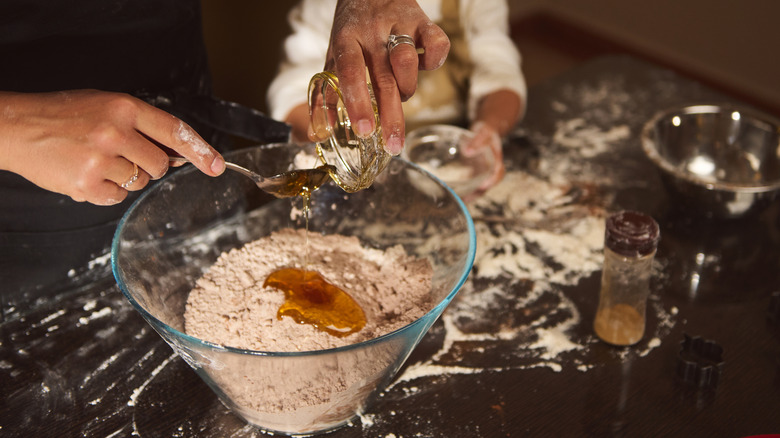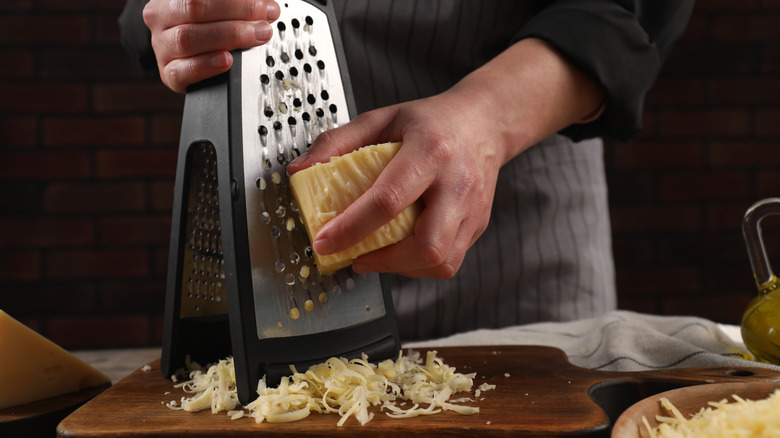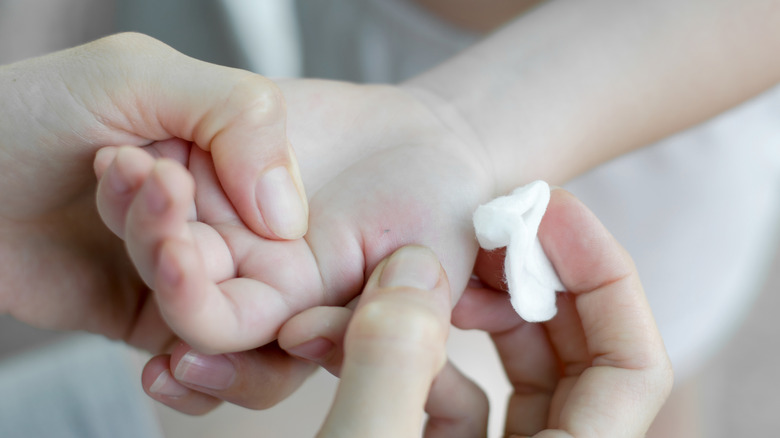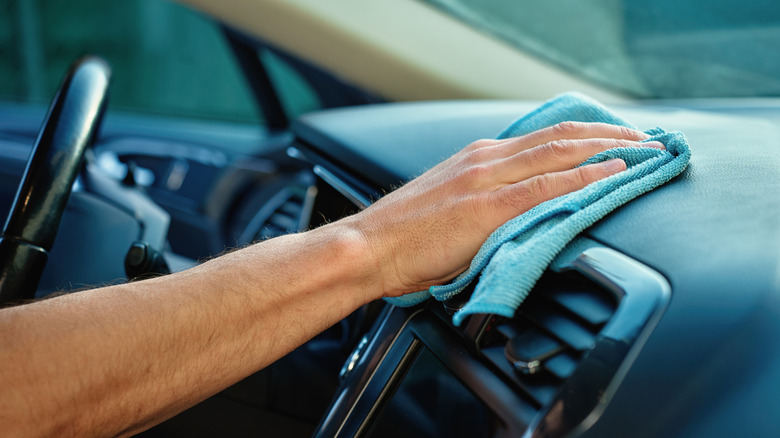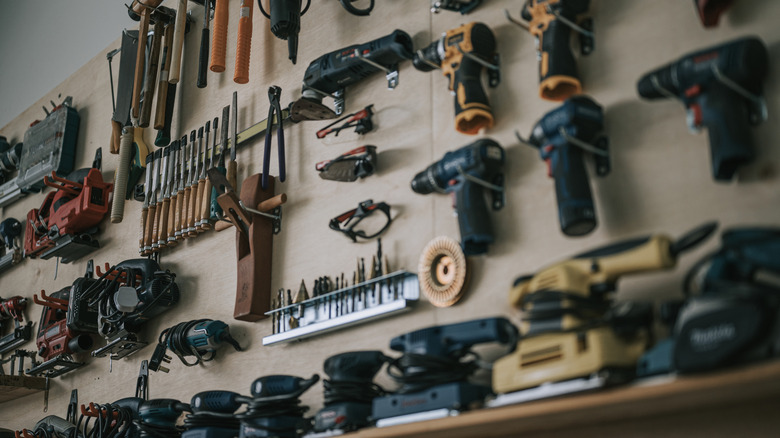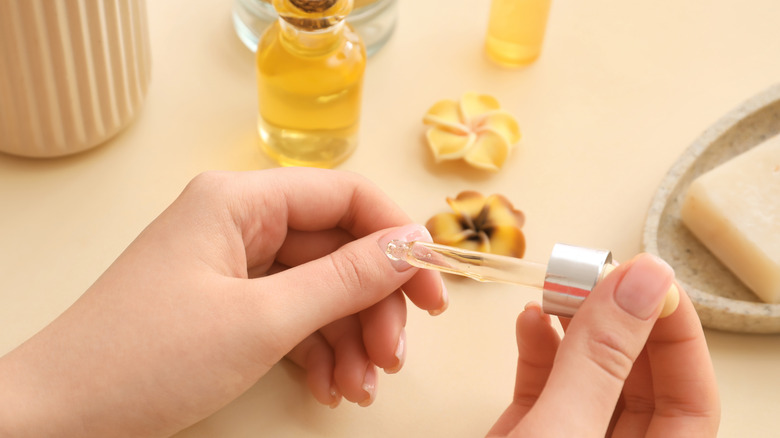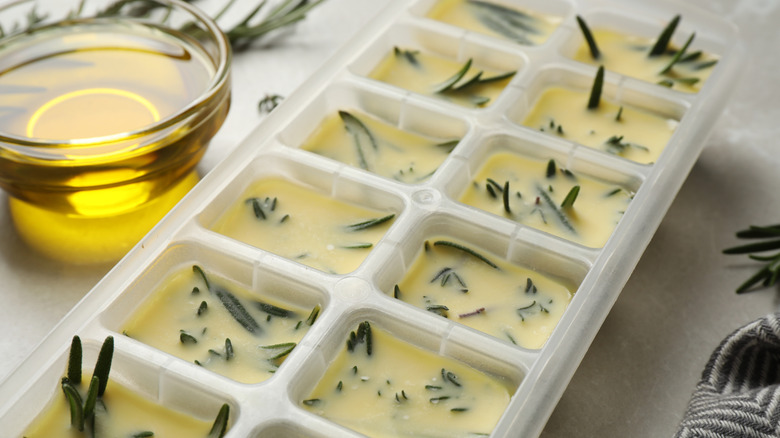26 Surprising Uses For Leftover Cooking Oil In Your Home
So you've just whipped up a batch of your favorite fried food — now what? The first order of business, of course, is to enjoy your delicious homemade meal. Next, you could make sure you've got the right way to dispose of your cooking oil – but why should all that good product go to waste? You might be surprised by how many ways leftover oil can be put to use around the house. From the garden to the kitchen to the craft room, there are plenty of options to give leftover cooking oil a second life.
Just make sure you're collecting and storing it properly. Wait for it to cool completely, and then strain it using a sieve or cheesecloth to make sure any food particles or burnt bits get left behind. Then, store the leftover oil in a sealed, light-proof container somewhere cool and dry. Once stored, you'll have it on hand for countless small tasks and handy projects around the house. Not sure where to start? Here are some of our favorite ways to use cooking oil around the house.
Polish wooden furniture
Wooden furniture is gorgeous, but sometimes it needs a little pick-me-up. Mix one part white vinegar with three parts leftover cooking oil (olive oil is a great choice here), and then shake it all together in a sealed container. Apply to furniture using a clean microfiber cloth, and watch as your polished wood gets a little of its razzle dazzle back. Just keep in mind that while these ingredients are generally natural and safe, it's always wise to test on a small inconspicuous spot first to prevent stains or damage.
Make soap
Oils and other fats are essential ingredients in soap. They help kick-start the reaction that creates a cleansing product, produce a great lather, and may even add some antioxidants or vitamins. If you're interested in trying your hand at creating your own soap, make it extra homemade by using some leftover cooking oil. Experiment with different oils — each creates unique lathers and benefits — but some soap makers recommend boiling and skimming the oil first to ensure cleanliness.
Season your cast iron
There's no need to dip into your fresh supply of oil when you're trying to care for your cast-iron pan. After cleaning your skillet, season it with a thin layer of your leftover cooking oil. Whether you're using fresh or used oil, grapeseed and flaxseed oils are great choices since they can tolerate high heat and don't leave a stiky residue.
Make a natural insecticide
Tired of using chemical-based insecticides in your garden? Use leftover cooking oil to repel bugs naturally. Combine a cup of it with a tablespoon of dish soap and shake it up. When you're ready to use it, take two tablespoons of that mixture, dilute it with a quart of water, and pour that into a spray bottle. Spray it over plants that are affected by pests like aphids or mites — the oil will suffocate the insects without harming the plants, keeping your garden bug-free.
Lubricate door hinges
Squeaky door hinges are one of those items that you always mean to get around to fixing– so why not wipe that task off your to-do list today with a little of your leftover cooking oil? You just need a couple of dabs of it on a paper towel or clean cloth. Gently rub the oil on the hinge, particularly near the pin. If it still squeaks, remove the pin and use an old toothbrush or folded paper towel to apply more oil inside the hinge.
Add to your compost
If you've figured out how to make your own DIY compost, you may already be adding a bit of oil to the pile. Make sure to only add small amounts, as too much and you risk threatening the air flow needed for the compost process. Just remember to use vegetable oils only, as animal or fruit-based oils may attract unwanted wildlife.
Remove rust from tools
If you've got small hand tools, garden tools, or other household objects showing signs of rust, grab your leftover cooking oil. Coat rusted areas with a thick layer of oil, then scrub with steel wool or a wire brush. The oil helps lift the rust off more efficiently. If it's a particularly big or stubborn amount, let it sit with the oil for about 30 minutes before coming back for another scrub.
Protect garden tools
If you've got a shed full of garden tools with wooden handles, you might already know how effective some cooking oils — particularly walnut and coconut – can be at protecting them. The oil penetrates the wood, forming a barrier that prevents moisture and warping. Just keep a rag and container of leftover oil nearby and wipe down tools occasionally to maintain them for years.
Remove paint
Painting is all fun and games — until you're covered in it. No need for an abrasive scrub-down, though. Use leftover cooking oil to remove stubborn oil-based paint from your skin or brushes. Just dab a little onto a rag, rub it over the paint, and you should see it quickly disappear. If it's still sticking, you can add a little salt or sugar for an extra exfoliating effect. Once it's gone, rinse with soap and water.
Start a fire
There's nothing like a cozy fire during the chilly months. Help it get started by spraying a few pieces of newspaper or cardboard with your leftover cooking oil. The added oil will give your spark a little more juice as you get the fire going, and allows it to light faster and burn longer. This means that instead of tending to the fire for ages, you'll be able to sit back and enjoy it.
Spray away dust
With your leftover oil in hand, you've probably already got everything you need to make a DIY dust-buster. Mix two tablespoons of your leftover oil with one cup of water and half a cup of distilled white vinegar, then pour it into a spray bottle. For a little scent or extra cleaning power, you can add a few drops of essential oil — think a fresh, citrus-y smell, or a calming lavender one — plus a drop or two of dish soap. Spritz it across dusty surfaces and then wipe the dust clean with a microfiber cloth.
Make your own lamp oil
Oil lamps have been used for thousands of years, and were once lit using whale oil or kerosene. Today, lamps are far harder to come by and are typically fueled by more sustainable materials. If you have an old-fashioned oil lamp but don't have formulated lamp oil on hand, you can use leftover olive oil to create a little light. Canola oil works in a pinch but produces more smoke and may clog wicks, making it better for outdoor or temporary use.
Give your hair a glow
Oils are a key ingredient in hair masks and scalp treatments, helping to strengthen and moisturize hair, reduce frizz, and pump lackluster locks full of vitamins and shine. Why go out and buy a store-bought mask when you have leftover cooking oil you could use to nourish your hair? Use rich oils like coconut, olive, sunflower, and almond. You can work it directly into your scalp for a deep condition, or combine with ingredients like honey and egg yolk for even more nutrients. Leave the mask on for 30 minutes before rinsing and shampooing.
Remove stubborn labels
No need to sacrifice your manicure or burn through elbow grease to scratch off stubborn labels, stickers, or price tags. Make a paste with equal parts baking soda and leftover cooking oil; one tablespoon of each is enough to start. Coat it over the stuck-on label and let it sit for 30 minutes. When you come back, use a damp, rough sponge or piece of steel wool to scrub. The sticky residue should rub right off.
Protect wicker furniture
You may have heard that you can use vegetable oil on your wicker furniture, but olive and coconut oils are also effective. Simply put a few dabs on a clean cloth and apply to the parts of your wicker or rattan furniture most prone to cracks and breaks. The oil will permeate the material, keeping it just supple and moisturized enough to bend without breaking.
Use it for the measuring cup hack
Every baker knows that measuring sticky ingredients like honey, jam, or maple syrup quickly turns into a mess — and it's tough to ensure you've got the right measurements when the ingredients want to just stick to the cup. To avoid this headache, use your fingers or a paper towel to apply a very thin layer of your leftover cooking oil to the measuring cup before using it. The ingredients won't stick as much, making cleanup easier and measurements more accurate.
Make grating cheese a breeze
Love freshly shredded cheese, but consider the grater your nemesis? Make it your friend by spraying a super-thin layer of your leftover cooking oil on the device before you use it. This makes the grating process more seamless and smooth. Plus, it also prevents excess sticking, so the whole cleanup process is a lot easier.
Remove splinters
Getting a splinter is no fun, and getting it out can be even worse. To ease the process, use your leftover oil. Depending on where the splinter is, soak the affected area in oil or apply a thick layer directly over it. Let the oil sit for several minutes to soften the skin, making it easier to remove the splinter without pain.
Moisturize your skin
Moisturizing with cooking oils like olive oil goes back as far as Cleopatra — so you've got good company if you want to use a little of your leftover oil on your skin. Dab it into clean skin in areas that get extra dry, like elbows, knees, knuckles, or cuticles. Just don't overdo it in more sensitive areas, like the face, where pores may clog. For dry or callused feet, apply before bedtime and then wear socks overnight to lock in the moisture.
Give your dashboard a makeover
Use leftover olive oil to clean and refresh a neglected dashboard without chemicals. First, dust off the dashboard with a clean microfiber cloth. Next, apply oil to a separate clean cloth and rub it into the surface; use a little extra pressure on stained areas to help lift grime. Though this is generally just as safe as most commercial cleaners, it's always smart to do a quick spot test in an inconspicuous area first to ensure your oil won't stain.
Lubricate hand tools
Ready to get hacking or sawing, but running into lubrication issues and don't have any mineral oil or WD-40 on hand? A quick swipe of leftover vegetable oil will do the trick. Just dab it on a paper towel and use it the same way you would WD-40 or mineral oil. It isn't a forever solution – cooking oils will break down and potentially get rancid faster than a product formulated for commercial lubricant use – but it will definitely last long enough to get the job done.
Make your own cuticle oil
Say goodbye to cracked cuticles with the help of your leftover cooking oil. A little nutrient-dense oil goes a long way in a homemade cuticle cream — just combine one tablespoon of leftover oils like olive, avocado, or grapeseed with one teaspoon of Vitamin E oil and a few drops of essential oils like lavender or frankincense. Apply to chapped cuticles with your fingertips or a dropper. This treatment can also be a thoughtful gift for friends in cold climates or those who frequently wash their hands.
Control mosquitos in outdoor water
Drizzle a thin layer of leftover cooking oil in standing outdoor water — like puddles or a kiddie pool — where mosquitoes could breed. The oil forms a barrier on the water surface, preventing mosquitoes from breaking through, making a new home, and laying eggs. This is a great hack if your kids want to splash in the driveway puddles without getting bites, but avoid it in places like a garden or swampy backyard, where the oil has the potential to mess with other wildlife or pets.
Make biodiesel
You never know when you're going to need your own biodiesel. Maybe it's for a backup generator, or to get a vehicle just as far as it needs to go to refuel. Whatever the reason, leftover cooking oil can be used to make biodiesel. The process is complex and requires technical knowledge, though plenty of YouTube tutorials can walk you through the process if you're ever in a jam.
Avoid sticky lids
Stubborn lids can be difficult to open without the right technique. Your leftover oil can come to the rescue. There are two ways to use it. First, if you're trying to open a jar of something syrupy, like honey, jam, or maple syrup, apply a little of the oil around the rim and let it sit for a bit. The oil helps loosen the residue, making the lid easier to open. Then, before you close it again, apply a thin layer of the oil around the rim. This should prevent some of the sticky buildup, making future uses easier.
Preserve your herbs
If your herb garden produces more than you can use, leftover cooking oil can help preserve them. Get an ice cube tray, fill each cube about halfway with the chopped herbs, and then pour your oil over them until they're fully submerged. Stick the tray in the freezer, and the next time you need just a pinch of rosemary or a hint of chives, you can pop out a frozen herb cube. Either melt it in whatever hot dish you've got going or warm it using a microwave or stovetop.
